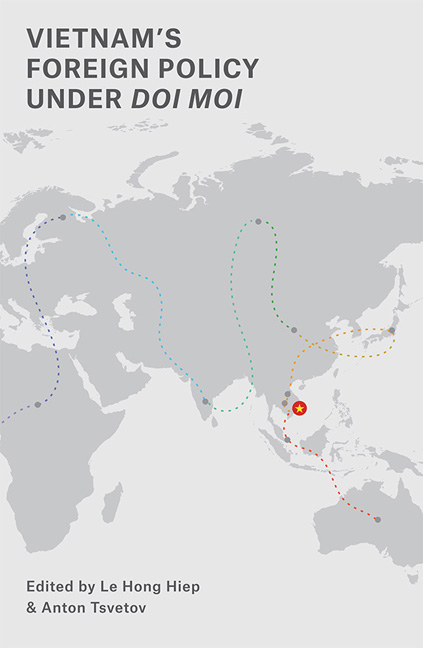Book contents
- Frontmatter
- Contents
- List of Tables
- List of Figures
- List of Abbreviations
- Acknowledgements
- About the Contributors
- PART I ANALYTICAL AND HISTORICAL FRAMEWORK
- PART II BILATERAL RELATIONSHIPS
- PART III MAJOR FOREIGN POLICY ISSUES
- 10 Vietnam's South China Sea Strategy since 2007
- 11 Vietnam's International Economic Integration under Doi Moi
- 12 Norm Diffusion through Trade: The Case of the EU–Vietnam Free Trade Agreement
- Index
11 - Vietnam's International Economic Integration under Doi Moi
from PART III - MAJOR FOREIGN POLICY ISSUES
Published online by Cambridge University Press: 04 July 2018
- Frontmatter
- Contents
- List of Tables
- List of Figures
- List of Abbreviations
- Acknowledgements
- About the Contributors
- PART I ANALYTICAL AND HISTORICAL FRAMEWORK
- PART II BILATERAL RELATIONSHIPS
- PART III MAJOR FOREIGN POLICY ISSUES
- 10 Vietnam's South China Sea Strategy since 2007
- 11 Vietnam's International Economic Integration under Doi Moi
- 12 Norm Diffusion through Trade: The Case of the EU–Vietnam Free Trade Agreement
- Index
Summary
International economic integration has been the centrepiece of Vietnam's reform programme under Doi Moi. Vietnam has evolved from a centrally-planned and mostly close economy before 1986 into one of the most open economies in the region. The country is now signatory or member of more than ten bilateral and regional free trade agreements (FTAs). The foreign-invested sector has become a major source of Vietnam's exports and economic growth, while its degree of openness measured by the share of exports and imports to GDP is around 160 per cent (WTO 2015).
This chapter reviews Vietnam's economic integration process by examining the contextual and ideological drivers behind its integration policy changes, as well as the issues facing Vietnam in the coming years. The chapter argues that due to its background as a command economy, Vietnam's international economic integration has been a dual process in which the integration happened alongside Vietnam's domestic transformation from a centrally-planned to a market-based economy. During this process, the economic thinking of the ruling Communist Party of Vietnam (CPV) has gradually evolved to adapt to changes in the internal and external conditions, while maximizing the benefits that international integration could contribute to the Party's domestic agenda of political stability and economic prosperity.
The chapter is divided into three sections. The first reviews the trajectory of Vietnam's international economic integration over the past thirty years, focusing on how the evolution in the CPV's thinking on international integration has led to corresponding policy changes. The second analyses the impacts of international economic integration on Vietnam, and the third discusses the new policy challenges for the country in its next phrase of expanded and deepened international integration.
- Type
- Chapter
- Information
- Vietnam's Foreign Policy under Doi Moi , pp. 235 - 259Publisher: ISEAS–Yusof Ishak InstitutePrint publication year: 2018



